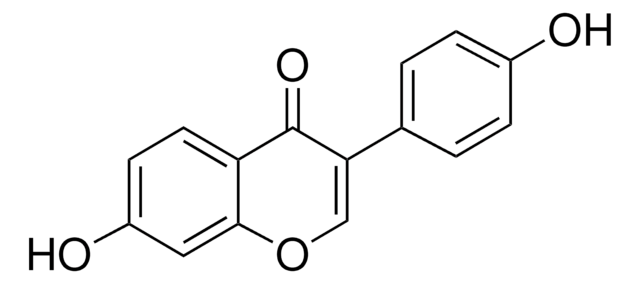40692
Atto 532 DOPE
suitable for fluorescence
Sinónimos:
1,2-Dioleoyl-sn-glycero-3-phosphoethanolamine labeled with Atto 532
Iniciar sesiónpara Ver la Fijación de precios por contrato y de la organización
About This Item
Código UNSPSC:
12352108
NACRES:
NA.32
Productos recomendados
Análisis
≥80.0% (HPCE)
fabricante / nombre comercial
ATTO-TEC GmbH
fluorescencia
λex 537 nm; λem 559 nm±5 nm in ethanol
idoneidad
suitable for fluorescence
temp. de almacenamiento
−20°C
Descripción general
Atto 532 is a fluorescent label related to the well-known dye Rhodamine 6G. Characteristic features of the label are strong absorption, high fluorescence quantum yield, high photostability, and excellent water solubility. Thus Atto 532 is highly suitable for single-molecule detection applications and high-resolution microscopy such as PALM, dSTORM, STED etc. Additionally the dye highly qualifies to be applied in flow cytometry (FACS), fluorescence in-situ hybridization (FISH) and many more. The fluorescence is excited most efficiently in the range 515 - 545 nm.
A suitable excitation source for Atto 532 is the 532 nm output of the frequency-doubled Nd:YAG laser.
Atto-Dye Labeled Phospholipids
Sigma-Aldrich offers a variety of glycero-phospholipids carrying one or two fatty acid groups (lipophilic groups) and a phosphate ester residue (hydrophilic group). They are labeled at the hydrophilic head group. After incorporation of the phospholipid into a membrane the fluorophore is located at the water/lipid interface of the membrane. We currently provide 1,2-dipalmitoyl-sn-glycero-3-phosphoethanolamine (DPPE), 1,2-dioleoyl-sn-glycero-3-phosphoethanolamine (DOPE), palmitoyl-sn-glycero-phosphoethanolamine (PPE), and 1,2-dimyristoyl-sn-glycero-3-phospho-ethanolamine (DMPE) labeled with Atto-dyes.
find more information here
A suitable excitation source for Atto 532 is the 532 nm output of the frequency-doubled Nd:YAG laser.
Atto-Dye Labeled Phospholipids
Sigma-Aldrich offers a variety of glycero-phospholipids carrying one or two fatty acid groups (lipophilic groups) and a phosphate ester residue (hydrophilic group). They are labeled at the hydrophilic head group. After incorporation of the phospholipid into a membrane the fluorophore is located at the water/lipid interface of the membrane. We currently provide 1,2-dipalmitoyl-sn-glycero-3-phosphoethanolamine (DPPE), 1,2-dioleoyl-sn-glycero-3-phosphoethanolamine (DOPE), palmitoyl-sn-glycero-phosphoethanolamine (PPE), and 1,2-dimyristoyl-sn-glycero-3-phospho-ethanolamine (DMPE) labeled with Atto-dyes.
find more information here
Información legal
This product is for Research use only. In case of intended commercialization, please contact the IP-holder (ATTO-TEC GmbH, Germany) for licensing.
Código de clase de almacenamiento
11 - Combustible Solids
Clase de riesgo para el agua (WGK)
WGK 3
Punto de inflamabilidad (°F)
Not applicable
Punto de inflamabilidad (°C)
Not applicable
Certificados de análisis (COA)
Busque Certificados de análisis (COA) introduciendo el número de lote del producto. Los números de lote se encuentran en la etiqueta del producto después de las palabras «Lot» o «Batch»
¿Ya tiene este producto?
Encuentre la documentación para los productos que ha comprado recientemente en la Biblioteca de documentos.
Technical Review. Types of Imaging-Direct STORM.
Jensen, E.; Crossman, D. J.
The Anatomical Record, 297(12), 2227-2231 (2014)
Breaking the diffraction barrier in fluorescence microscopy at low light intensities by using reversibly photoswitchable proteins.
Hofmann, M.; et al.
Proceedings of the National Academy of Sciences of the USA, 102(49), 17565?17569-17565?17569 (2005)
Fluorescence lifetime imaging with pulsed diode laser enabled stimulated emission.
Ge, J.; Kuang, C.; Lee, SS.; Kao, FJ
Optics Express, 20(27), 28216-28216 (2012)
Fluoreszierende Rhodamine und fluorogene Carbopyronine fur die STED-Mikroskopie lebender Zellen.
Butkevich, Alexey N.; et al.
Angewandte Chemie (International Edition in English), 128(10), 3350-3355 (2016)
Analysis of replication factories in human cells by super-resolution light microscopy.
Cseresnyes, Z.; et al.
BMC Cell Biology, 10(1), 88-88 (2009)
Nuestro equipo de científicos tiene experiencia en todas las áreas de investigación: Ciencias de la vida, Ciencia de los materiales, Síntesis química, Cromatografía, Analítica y muchas otras.
Póngase en contacto con el Servicio técnico





